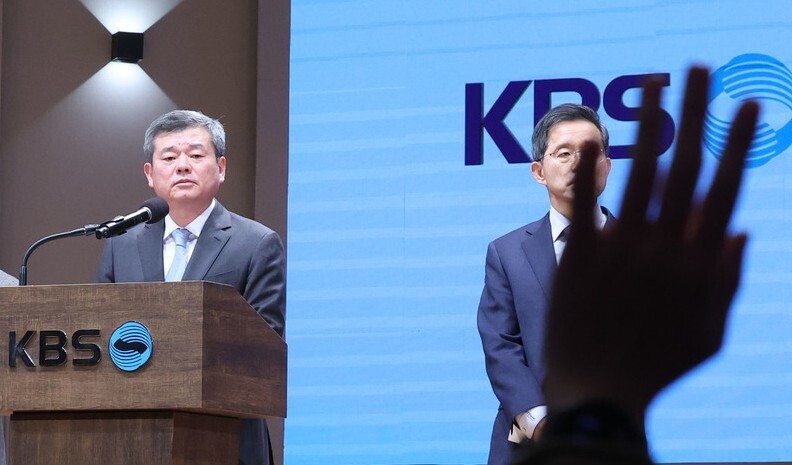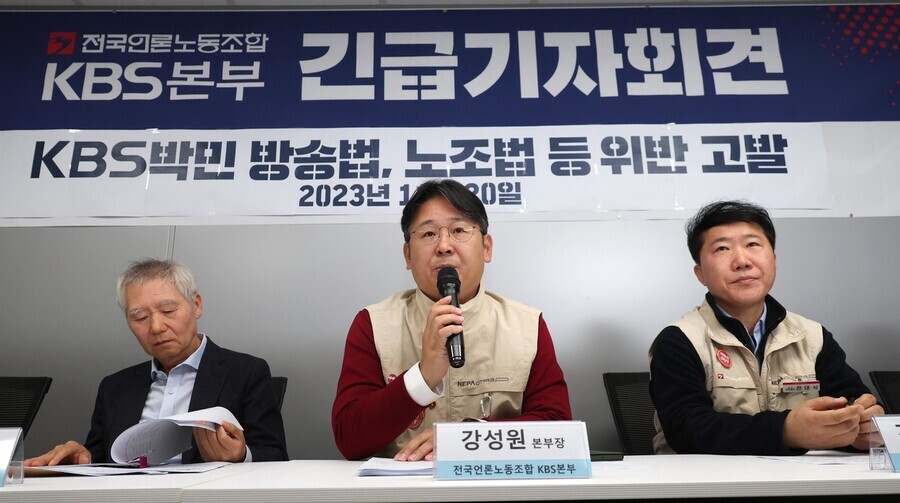hankyoreh
Links to other country sites 다른 나라 사이트 링크
KBS union presses charges against new CEO for “trampling” democratic broadcasting procedure

The KBS chapter of the National Union of Media Workers (NUMW) shared that it plans to press charges against the new president of KBS, Park Min, for violating the Broadcasting Act and the Trade Union and Labor Relations Adjustment Act in relation to the recent controversy over apparent violations of production autonomy after programs were forcibly discontinued and cast were replaced.
The union added that a complaint will be filed with the prosecution service on Tuesday and a special labor inspection will be requested from the Ministry of Employment and Labor. This comes one week after Park began his tenure as KBS president and CEO on Nov. 13.
During a press conference held in the union conference room at KBS on Monday, the NUMW’s KBS chapter stated it plans to take legal action against Park, who it alleged “violated the Broadcasting Act, KBS programming regulations, and collective agreements.”
“The minimum safety devices ensuring fair broadcasting we built up over the years through internal struggle are being torn down relentlessly,” argued Kang Sung-won, the president of the NUMW’s KBS chapter. “We will shed light on unlawful acts one by one and demand juridical accountability until the end.”
Based on the fact that the nominee for KBS’ radio center director instructed the production crew for the current affairs radio program “Ju Jin-u Live” to replace the show’s host and organize special programming, that this nominee made reference to the “will of the company president,” and that Park said he would “take action” when asked about “Ju Jin-u Live” during his pre-appointment confirmation hearing at the National Assembly, the union claimed that Park violated Article 4 of the Broadcasting Act, which guarantees the “freedom and independence of broadcast programming.”

The union further pointed to the sudden deletion of the news program “The Live” from its scheduled time slot on the morning of Park’s first day on the job, and the program’s later de facto cancelation, as well as the swapping out the head anchor for “News 9” as examples of the new boss’s violations of programming regulations and collective agreements. According to Articles 6 and 7 of the broadcast programming regulations at KBS, created pursuant to the Broadcasting Act, those overseeing production must listen to the opinions of and consult with working-level staff when it comes to changes to broadcasts and similar matters.
During the press conference, Jeong Myeong-a, a certified labor attorney with the law firm New Day, revealed that since Park took over as president of the broadcaster, there had been “numerous violations that can be construed as unfair labor practices,” and that as a result, the union would be applying for a special labor inspection with the Ministry of Employment and Labor.
Under the special labor inspection system, the Ministry of Employment and Labor dispatches an inspector to a place of business that has roused social criticism to conduct an examination. If the inspector discovers conduct that is illegal, the case becomes a criminal one and administrative action is taken.
Jeong stressed that noncompliance with the programming regulations and collective agreement could be considered illegal conduct that undermines the labor conditions of broadcasting workers.
In fact, in its final verdict that found the 2012 strike by MBC workers to be legitimate, the Supreme Court stated, “The fairness of a broadcast must be determined not by its outcomes but whether democratic decision-making was present in the production and programming.”
“For an employer to ignore this procedure is illegal,” the court found.
By Park Kang-su, staff reporter
Please direct questions or comments to [english@hani.co.kr]

Editorial・opinion
![[Editorial] Intensifying US-China rivalry means Seoul must address uncertainty with Beijing sooner than later [Editorial] Intensifying US-China rivalry means Seoul must address uncertainty with Beijing sooner than later](https://flexible.img.hani.co.kr/flexible/normal/500/300/imgdb/original/2024/0517/8117159322045222.jpg) [Editorial] Intensifying US-China rivalry means Seoul must address uncertainty with Beijing sooner than later
[Editorial] Intensifying US-China rivalry means Seoul must address uncertainty with Beijing sooner than later![[Column] When ‘fairness’ means hate and violence [Column] When ‘fairness’ means hate and violence](https://flexible.img.hani.co.kr/flexible/normal/500/300/imgdb/original/2024/0516/7417158465908824.jpg) [Column] When ‘fairness’ means hate and violence
[Column] When ‘fairness’ means hate and violence- [Editorial] Yoon must stop abusing authority to shield himself from investigation
- [Column] US troop withdrawal from Korea could be the Acheson Line all over
- [Column] How to win back readers who’ve turned to YouTube for news
- [Column] Welcome to the president’s pity party
- [Editorial] Korea must respond firmly to Japan’s attempt to usurp Line
- [Editorial] Transfers of prosecutors investigating Korea’s first lady send chilling message
- [Column] Will Seoul’s ties with Moscow really recover on their own?
- [Column] Samsung’s ‘lost decade’ and Lee Jae-yong’s mismatched chopsticks
Most viewed articles
- 1For new generation of Chinese artists, discontent is disobedience
- 2[Editorial] Transfers of prosecutors investigating Korea’s first lady send chilling message
- 3[Exclusive] Unearthed memo suggests Gwangju Uprising missing may have been cremated
- 4[Editorial] Intensifying US-China rivalry means Seoul must address uncertainty with Beijing sooner t
- 5S. Korea “monitoring developments” after report of secret Chinese police station in Seoul
- 6N. Korean media upgrades epithet for leader’s daughter from “beloved” to “respected”
- 7Yoon says concern about biased diplomacy is being incited by “communist totalitarian forces”
- 8[Column] US troop withdrawal from Korea could be the Acheson Line all over
- 9Xi, Putin ‘oppose acts of military intimidation’ against N. Korea by US in joint statement
- 1060% of young Koreans see no need to have kids after marriage